|
Featured picture tools: |
These featured pictures, as scheduled below, appeared as the picture of the day (POTD) on the English Wikipedia's Main Page in December 2015. Individual sections for each day on this page can be linked to with the day number as the anchor name (e.g. [[Wikipedia:Picture of the day/December 2015#1]] for December 1).
You can add an automatically updating POTD template to your user page using {{Pic of the day}} (version with blurb) or {{POTD}} (version without blurb). For instructions on how to make custom POTD layouts, see Wikipedia:Picture of the day.Purge server cache
December 1

|
Typical Filipino handmade brooms in Banaue. Brooms are cleaning tools consisting of fibers (often made of materials such as plastic, hair, or corn husks) attached to, and roughly parallel to, a cylindrical handle. In Asian countries there is often a distinction between a "hard broom" and a "soft broom", named for the types of fibers used. Soft brooms are made for sweeping the walls of cob webs and spiders, whereas hard brooms are made for sweeping dirt off sidewalks. Photograph: Uwe Aranas
Recently featured:
|
December 2

|
Gebang is an 8th-century Hindu temple located on the outskirts of Yogyakarta, Indonesia. Built by the Medang Kingdom, the temple was buried by lahar from Mount Merapi until it was rediscovered and reconstructed in the 1930s. Gebang measures 5.25 by 5.25 metres (17.2 ft × 17.2 ft) at the base, and has a height of 7.75 metres (25.4 ft). Photograph: Chris Woodrich
Recently featured:
|
December 3

|
David Villa (b. 1981) is a Spanish professional footballer who plays as a striker and also serves as captain for American club New York City FC. Before transferring to the United States, Villa played for a number of Spanish teams, including FC Barcelona, with whom he won his first La Liga and UEFA Champions League titles, Valencia CF, and Atlético de Madrid, shown here after scoring a goal. As part of the Spanish national football team, Villa scored three goals at the 2006 World Cup, was the top scorer at Euro 2008, and earned the Silver Boot at the 2010 World Cup. Photograph: Carlos Delgado
Recently featured:
|
December 4
Subpage 1
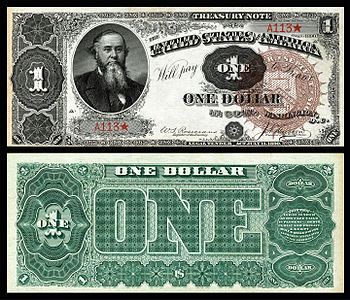
|
An 1890 Treasury Note in the denomination of $1, depicting Edwin Stanton on the obverse. This type of representative money was issued by the United States government to individuals selling silver bullion to the Treasury, and was redeemable in either gold or silver coin. The 1890 series is distinguished by its ornate background, intended to impede counterfeiting. Other denominations: $2, $5, $10, $20, $100, $1000 Banknote: Bureau of Engraving and Printing (image courtesy of the National Numismatic Collection, National Museum of American History)
Recently featured:
|
Subpage 2

|
An 1890 Treasury Note in the denomination of $2, depicting James McPherson on the obverse. This type of representative money was issued by the United States government to individuals selling silver bullion to the Treasury, and was redeemable in either gold or silver coin. The 1890 series is distinguished by its ornate background, intended to impede counterfeiting. Other denominations: $1, $5, $10, $20, $100, $1000 Banknote: Bureau of Engraving and Printing (image courtesy of the National Numismatic Collection, National Museum of American History)
Recently featured:
|
Subpage 3

|
An 1890 Treasury Note in the denomination of $5, depicting George H. Thomas on the obverse. This type of representative money was issued by the United States government to individuals selling silver bullion to the Treasury, and was redeemable in either gold or silver coin. The 1890 series is distinguished by its ornate background, intended to impede counterfeiting. Other denominations: $1, $2, $10, $20, $100, $1000 Banknote: Bureau of Engraving and Printing (image courtesy of the National Numismatic Collection, National Museum of American History)
Recently featured:
|
Subpage 4
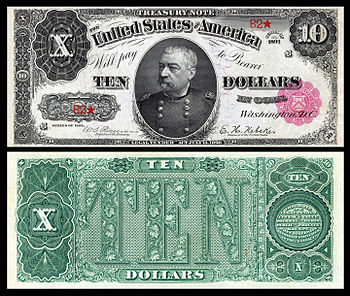
|
An 1890 Treasury Note in the denomination of $10, depicting Philip Sheridan on the obverse. This type of representative money was issued by the United States government to individuals selling silver bullion to the Treasury, and was redeemable in either gold or silver coin. The 1890 series is distinguished by its ornate background, intended to impede counterfeiting. Other denominations: $1, $2, $5, $20, $100, $1000 Banknote: Bureau of Engraving and Printing (image courtesy of the National Numismatic Collection, National Museum of American History)
Recently featured:
|
Subpage 5

|
An 1890 Treasury Note in the denomination of $20, depicting John Marshall on the obverse. This type of representative money was issued by the United States government to individuals selling silver bullion to the Treasury, and was redeemable in either gold or silver coin. The 1890 series is distinguished by its ornate background, intended to impede counterfeiting. Other denominations: $1, $2, $5, $10, $100, $1000 Banknote: Bureau of Engraving and Printing (image courtesy of the National Numismatic Collection, National Museum of American History)
Recently featured:
|
Subpage 6

|
An 1890 Treasury Note in the denomination of $100, depicting David Farragut on the obverse. This type of representative money was issued by the United States government to individuals selling silver bullion to the Treasury, and was redeemable in either gold or silver coin. The 1890 series is distinguished by its ornate background, intended to impede counterfeiting. Other denominations: $1, $2, $5, $10, $20, $1000 Banknote: Bureau of Engraving and Printing (image courtesy of the National Numismatic Collection, National Museum of American History)
Recently featured:
|
Subpage 7

|
An 1890 Treasury Note in the denomination of $1000, depicting George Meade on the obverse. This type of representative money was issued by the United States government to individuals selling silver bullion to the Treasury, and was redeemable in either gold or silver coin. The 1890 series is distinguished by its ornate background, intended to impede counterfeiting. Other denominations: $1, $2, $5, $10, $20, $100 Banknote: Bureau of Engraving and Printing (image courtesy of the National Numismatic Collection, National Museum of American History)
Recently featured:
|
December 5

|
|
Two Jet Propulsion Laboratory engineers stand with three vehicles, providing a size comparison of three generations of Mars rovers. Front and center is the flight spare for the first Mars rover, Sojourner, which landed on Mars in 1997 as part of the Mars Pathfinder Project. On the left is a Mars Exploration Rover test vehicle, a working sibling to Spirit and Opportunity, which landed on Mars in 2004. On the right is a test rover for the Mars Science Laboratory, which landed Curiosity on Mars in 2012. Photograph: NASA
Recently featured:
|
December 6

|
Self Portrait with Physalis, by Egon Schiele (1890–1918) completed in 1912. Schiele, an early expressionist painter from Tulln an der Donau, Lower Austria, produced numerous self-portraits during his career, including several in which he depicted himself naked. His works are characterized by twisted body shapes, intensity and raw sexuality. Painting: Egon Schiele
Recently featured:
|
December 7

|
|
A 19th-century set of ten cards depicting events in the history of ballooning and parachuting. These cards depict, from left to right:
Top row:
Bottom row:
Chromolithograph: Romanet & cie.
Recently featured:
|
December 8

|
One of the Kasubi Tombs in Kampala, Uganda. The burial grounds of four kabakas (kings of Buganda), the tombs were first built in 1881 but destroyed in a fire on 16 March 2010. The Bugandan and Ugandan administration have vowed to rebuild this World Heritage Site. Photograph: not not phil
Recently featured:
|
December 9

|
US Olympic gymnast McKayla Maroney posing with President Barack Obama. They are wearing the "McKayla is not impressed" expression of disappointment which became an internet phenomenon after Maroney made it upon winning a silver medal at the 2012 London Olympics. Yahoo! listed the photograph of Maroney on the podium as the most viral picture of 2012. Photograph: Pete Souza; edit: El Grafo
Recently featured:
|
December 10

|
A boat tour among the icebergs on Tasman Lake, a proglacial lake formed by the recent retreat of the Tasman Glacier in New Zealand's Mount Cook National Park. As the glacier retreats, icebergs break off from a submerged apron of glacial ice that projects into the lake. Photograph: Avenue
Recently featured:
|
December 11

|
Fez is an indie puzzle platform game developed by Polytron Corporation and released in 2012. The player-character Gomez receives a fez that reveals his two-dimensional world to be one of four sides of a three-dimensional world; the player rotates between these four views to realign platforms, solve the game's puzzles, and collect cubes and cube fragments to restore order to the universe. Though criticized for technical issues, and in-game navigation and backtracking, Fez was commended for its emphasis on discovery and freedom, and became a keystone example of independent video game development. Illustration: Bryan Lee O'Malley
Recently featured:
|
December 12

|
The ruddy kingfisher (Halcyon coromanda) is a medium-sized tree kingfisher which is widely distributed in the forests of east and southeast Asia. Like other kingfishers, ruddy kingfishers generally feed on fish, crustaceans, and large insects, though in areas with less running water they are known to take frogs and other amphibians. Photograph: Jason Thompson
Recently featured:
|
December 13

|
Cliff Dwellers is a painting by George Bellows completed in 1913. It shows a crowd on New York City’s Lower East Side, with people spilling out of tenement buildings onto the streets, stoops, and fire escapes. The work was first displayed at the 1913 Armory Show, and is currently in the collection of the Los Angeles County Museum of Art. Painting: George Bellows
Recently featured:
|
December 14

|
Lee Remick (1935–1991) was an American film and television actress. She made her film debut in 1957 with Elia Kazan's A Face in the Crowd, and went on to appear in more than twenty films, including Anatomy of a Murder (1959), Days of Wine and Roses (1962), and The Omen (1976). Photograph: Allan Warren; restoration: Keraunoscopia
Recently featured:
|
December 15

|
|
The Gall–Peters projection, named after James Gall and Arno Peters, is a specialization of a configurable equal-area map projection known as the cylindrical equal-area projection. It achieved considerable notoriety in the late 20th century as the centerpiece of a controversy surrounding the political implications of map design; Peters promoted it as a more faithful representation than the Mercator projection, which inflates the sizes of regions farther from the equator and thus makes the (mostly technologically underdeveloped) equatorial countries appear smaller and therefore, according to Peters, less significant. Map: Strebe, using Geocart
Recently featured:
|
December 16
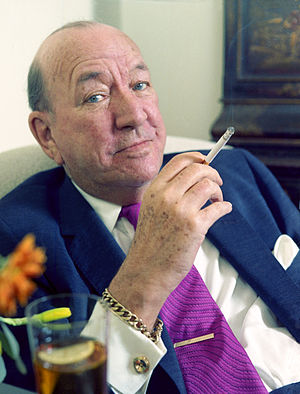
|
Sir Noël Coward (1899–1973) was an English playwright, composer, director, actor and singer. Coward published more than 50 plays, many of which have remained in the regular theatre repertoire. He composed hundreds of songs, well over a dozen musical theatre works, screenplays, poetry, several volumes of short stories, a novel, and a three-volume autobiography. Coward's stage and film acting and directing career spanned six decades, during which he starred in many of his own works and won an Academy Honorary Award in 1943. In the 1950s he achieved fresh success as a cabaret performer, performing his own songs. His plays and songs achieved new popularity in the 1960s and 1970s, and his work and style continue to influence popular culture. Photograph: Allan Warren; edit: Adam Cuerden
Recently featured:
|
December 17
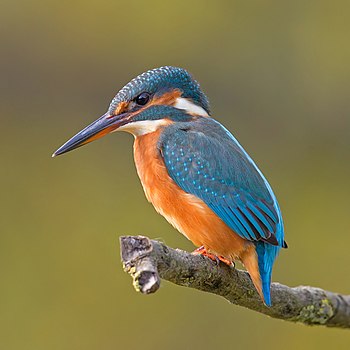
|
The common kingfisher (Alcedo atthis) is a small kingfisher with seven subspecies recognized within its wide distribution across Eurasia and North Africa. It is resident in much of its range, but migrates from areas where rivers freeze in winter. This sparrow-sized bird feeds mainly on fish, caught by diving, and has special visual adaptions to enable it to see prey under water. The glossy white eggs are laid in a nest at the end of a burrow in a riverbank. Photograph: Andreas Trepte; edit: Hans Hillewaert
Recently featured:
|
December 18
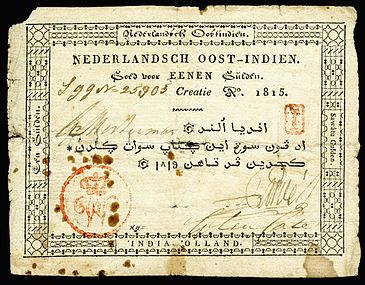
|
A banknote for one Netherlands Indies gulden. This note was issued in 1815 as part of the first Dutch government-issued paper money in the Netherlands Indies. However, in 1818 the issuing bank—De Bank Courant en Bank van Leening—was dissolved due to a lack of capital, and six months later, this first series of notes was declared worthless. Banknote: De Bank Courant en Bank van Leening (image courtesy of the National Numismatic Collection, National Museum of American History)
Recently featured:
|
December 19

|
SMS Odin was the lead ship of her class of coastal defense ships built for the German Imperial Navy. Named for the Norse god, Odin was built by the Kaiserliche Werft Danzig shipyard between 1893 and 1896, and was armed with a main battery of three 24-centimeter (9.4 in) guns. She served in the German fleet throughout the 1890s and was rebuilt in 1901–1903. She served in the VI Battle Squadron after the outbreak of World War I in August 1914, but saw no action. Odin was demobilized in 1915 and used as a tender thereafter. After the war, she was rebuilt as a merchant ship and served in this capacity until 1935, when she was broken up for scrap. Lithograph: Hugo Graf; restoration: Adam Cuerden
Recently featured:
|
December 20

|
Century-old buildings of the Historic Michigan Boulevard District stand near East Monroe Street and Millennium Park in Chicago, Illinois. These include the Monroe Building (1910), University Club (1907), Chicago Athletic Club (1893), Willoughby Tower (1927), and Montgomery Ward (1897). Behind them is the Legacy Tower, a 72-story skyscraper by the architectural firm Solomon, Cordwell, and Buenz, which was built in 2009. Photograph: Diego Delso
Recently featured:
|
December 21

|
American singer Elvis Presley meeting then-president Richard Nixon on December 21, 1970. During the meeting, the singer expressed his patriotism and his contempt for hippies, the growing drug culture, and the counterculture in general. Presley then asked Nixon for a Bureau of Narcotics and Dangerous Drugs badge, to signify official sanction of his patriotic efforts. Nixon gave Presley the badge and expressed a belief that Presley could send a positive message to young people and that it was therefore important he retain his credibility. Photograph: Oliver F. Atkins
Recently featured:
|
December 22

|
The willow tit (Poecile montanus) is a passerine bird in the tit family commonly found throughout temperate and subarctic Europe and northern Asia. These birds feed on insects, caterpillars, and seeds, and nest in holes in (mostly conifer) trees. Photograph: Francis C. Franklin
Recently featured:
|
December 23

|
|
A map depicting the Kingdom of Armenia in c. 50 BC. The kingdom existed from 321 BC to 428 AD; its history is divided into successive reigns by three royal dynasties: Orontid, Artaxiad, and Arsacid. During the Byzantine–Sasanian wars, Armenia was ultimately partitioned into Byzantine Armenia and Persian Armenia.
Recently featured:
|
December 24
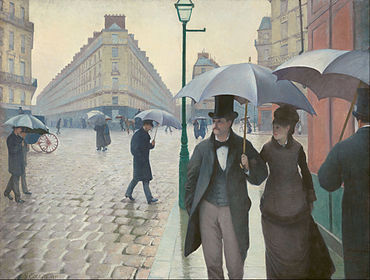
|
Paris Street; Rainy Day (1877) is the best known painting by the French artist Gustave Caillebotte. This large oil painting shows a number of figures walking through the Carrefour de Moscou, a road intersection to the east of the Gare Saint-Lazare in north Paris. It was first shown at the Third Impressionist Exhibition of 1877, and is currently owned by the Art Institute of Chicago. Painting: Gustave Caillebotte
Recently featured:
|
December 25

|
Dominosteine are sweets primarily sold during the Christmas season in Germany and Austria. The base consists of Lebkuchen, followed by a layer of sour cherry or apricot jelly and a layer of either marzipan or persipan. The dominostein is covered with a thin icing of dark chocolate. Photograph: Heinrich Pniok
Recently featured:
|
December 26

|
|
The Bixby Creek Bridge is a reinforced concrete open-spandrel arch bridge in Big Sur, California. Prior to its opening in 1932, local residents were virtually cut off during winter as the old coast road, running as far as 11 miles (18 km) inland, was often impassable. At its completion, the bridge was, at 320 feet (98 m), the longest concrete arch span on the California State Highway System. It is one of the tallest single-span concrete bridges in the world. Photograph: David Iliff
Recently featured:
|
December 27

|
The wandering albatross (Diomedea exulans) is a large seabird from the albatross family which is found in the seas around Antarctica. The first albatross to be described (though it was long grouped with Tristan and the Antipodean albatrosses), the wandering albatross is the largest member of its genus and one of the largest birds in the world. Photograph: JJ Harrison
Recently featured:
|
December 28

|
The first jet-assisted take-off performed in the United States. In this August 1941 test, an ERCO Ercoupe piloted by Captain Homer A. Boushey Jr. was fitted with a GALCIT booster and took off from March Field, California. JATO assisted take-off systems are used to help overloaded aircraft into the air by providing additional thrust in the form of small rockets. Photograph: NASA/JPL; restoration: Chris Woodrich
Recently featured:
|
December 29

|
Kei Nishikori (b. 1989) is a Japanese professional tennis player. Nishikori qualified for his first ATP main draw event at the Countrywide Classic in Los Angeles at the age of 17; in 2008 he was named ATP Newcomer of the Year. He has won ten singles titles and was runner-up at the 2014 US Open. Ranked No. 8 in the world as of November 23, 2015, he is the only male Japanese tennis player ever to be ranked inside the top 10 in ATP Singles Ranking and reached his career-high ranking of world No. 4 in March 2015. He is also the first male player from an Asian country to reach a Grand Slam singles final and the first to qualify for the ATP World Tour Finals. Photograph: David Iliff
Recently featured:
|
December 30

|
|
Pellets of 99.9% pure argon-arc remelted hafnium, with visible crystalline structures. The colors are a thin-film effect in the oxide layer; this chemical element is generally a lustrous, silvery gray, tetravalent transition metal. Hafnium is widely used in filaments and electrodes, as well as in some superalloys. Photograph: Heinrich Pniok
Recently featured:
|
December 31

|
A long-exposure shot of the finale of the second act of IllumiNations: Reflections of Earth, the nightly fireworks show at Epcot in Walt Disney World. This three-act show premiered in 1999 and has won eleven straight Golden Ticket Awards for Best Outdoor Night Production Show. Photograph: Chensiyuan
Recently featured:
|
Picture of the day archives and future dates